In the evolving landscape of adolescent and young adult (AYA) oncology care, a groundbreaking study out of the University of Florida Health Cancer Center sheds new light on the critical intersection of cancer treatment and scholastic performance. Presented at the prestigious American Society of Clinical Oncology (ASCO) 2025 Annual Meeting, this research underscores the profound need for comprehensive educational support systems tailored specifically to AYAs navigating the complex challenges of cancer therapy.
Cancer diagnosis during adolescence and young adulthood not only threatens physical health but also disrupts essential developmental processes, particularly those associated with educational and career trajectories. The UF Health research team highlights four pivotal support domains indispensable for holistic AYA cancer care: the facilitation of school accommodations, mitigation of identity loss caused by forfeiting extracurricular activities, guidance through academic and career disruptions, and preservation of peer relationships. This multi-faceted framework speaks directly to the nuanced psychosocial and functional needs unique to this population.
Dr. Carla L. Fisher, the study’s lead author and a professor in the Department of Health Outcomes and Biomedical Informatics, explains that scholastic engagement represents more than mere academic achievement for AYAs—it serves as a vital source of empowerment and motivation during an otherwise tumultuous treatment period. Contrary to common assumptions that educational demands might constitute an undue burden, this research reveals that maintaining scholastic involvement is integral to fostering autonomy and reinforcing self-identity amid the uncertainty caused by cancer diagnosis and treatment.
The study’s methodology is notable for its robust triangulation of perspectives, integrating firsthand accounts from AYAs diagnosed between ages 15 and 29, their parent caregivers, and multidisciplinary clinicians embedded within AYA oncology programs. This triangulated approach enriches the validity of the findings by crystallizing common themes and identifying critical care gaps acknowledged by all stakeholder groups. Indeed, the convergent feedback highlights an urgent need for healthcare systems to embed scholastic support mechanisms into the standard care protocol for AYAs.
Emerging evidence from this investigation further positions scholastic support as a buffer against the deleterious psychological and socioeconomic sequelae often observed long-term in young cancer survivors. Disruptions in education can precipitate compounding mental health vulnerabilities, including anxiety and depression, alongside financial instabilities stemming from interrupted career advancement. By proactively addressing academic continuity and accommodation, clinicians may significantly diminish these downstream effects, fostering more resilient survivorship trajectories.
Innovatively, Dr. Fisher and her co-researcher Dr. Raymond Mailhot have pioneered a novel methodological paradigm by linking patient medical data with academic performance metrics obtained directly from school districts. This groundbreaking data synthesis offers an unprecedented opportunity to quantitatively assess the real-world implications of cancer treatment on educational outcomes and to develop targeted interventions informed by empirical evidence rather than anecdotal accounts alone.
The integration of this dual-source data analytic model marks a critical advancement in patient-centered oncology research, enabling clinicians and policymakers to operationalize scholastic performance as a functional outcome metric. This underscores a paradigm shift wherein academic achievement is recognized not merely as a collateral casualty of illness but as a fundamental dimension of cancer survivorship deserving systematic evaluation and support.
Complementing this foundational research, UF Health Cancer Center investigators including Drs. Carma Bylund and Joanne Lagmay collaboratively contribute their expertise in communication and clinical oncology. Together, the team’s interdisciplinary approach incorporates behavioral science, medical treatment, and health policy perspectives to develop comprehensive supportive care frameworks tailored for the AYA population.
Moreover, the initiative’s translational impact extends beyond AYAs directly affected by cancer. Leveraging funding from The Leukemia & Lymphoma Society and the National Cancer Institute, researchers recently launched a free communication skills program designed to assist adult children caregivers of blood cancer patients. Adaptations of this model are underway to support parent caregivers of AYAs, recognizing the pivotal role family systems play in managing cancer’s multidimensional challenges.
This research signals a clarion call to oncology practitioners and educational institutions alike to reimagine cancer care environments that holistically encompass the psychosocial and developmental needs of young patients. Addressing the intricate interplay between illness and education will not only enhance quality of life during treatment but also promote more positive long-term outcomes, ultimately reshaping survivorship as a multi-dimensional continuum rather than a purely clinical endpoint.
As the field progresses, continued interdisciplinary collaboration and innovative data integration will be paramount in refining and expanding support mechanisms. Future efforts must concentrate on tailoring individualized education plans that dynamically adjust to the fluctuating demands of treatment regimens, while fostering environments conducive to peer connection and identity preservation. This study lays essential groundwork for such transformative endeavors, paving the way toward more integrative and responsive AYA oncology care models.
In sum, the UF Health Cancer Center’s research represents a seminal advancement in recognizing scholastic performance as a critical pillar of AYA cancer care. By systematically elucidating unmet supportive care needs and pioneering novel data linkage methodologies, this work provides a blueprint for enhancing empowerment, continuity, and wellbeing for young patients navigating the dual challenges of cancer and education in the modern era.
Subject of Research: Educational Support and Scholastic Performance in Adolescent and Young Adult (AYA) Cancer Patients
Article Title: (Not provided)
News Publication Date: (Not provided)
Web References:
- ASCO Annual Meeting 2025 Abstract
- ASCO Annual Meeting
- UF Health Department of Health Outcomes and Biomedical Informatics
- Free Communications Skills Program
References: Not explicitly provided in the content
Image Credits: Not provided
Keywords: Cancer, Oncology, Cancer Policy, Cancer Treatments




